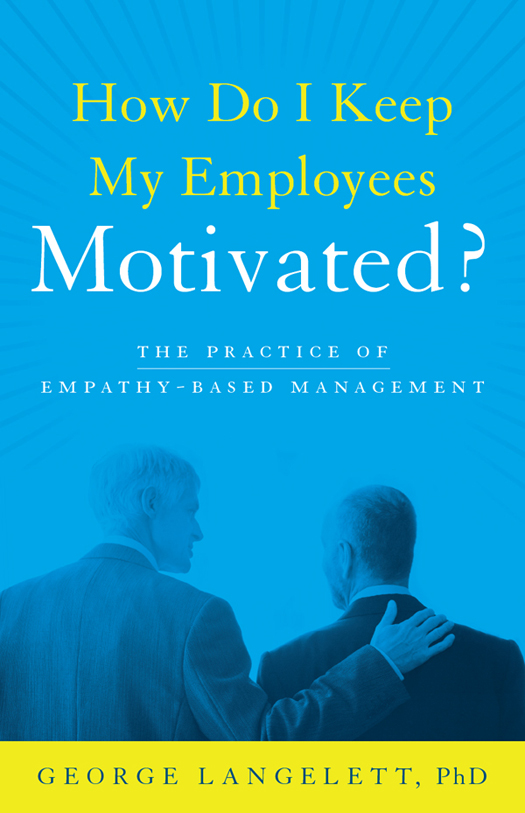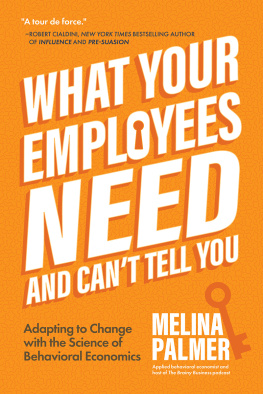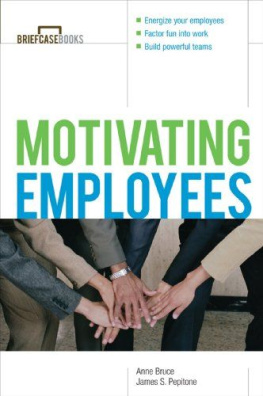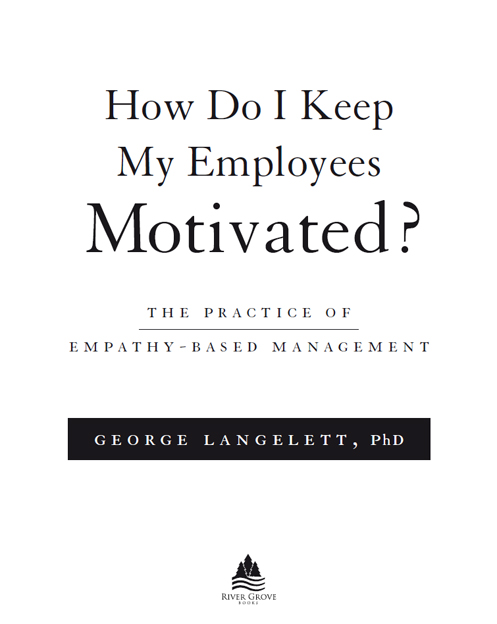
How Do I Keep My Employees Motivated? is an imperative book for leaders in all fields. In order to motivate, you must be able to comprehend and connect on a personal level.
TOM DASCHLE, former U.S. Senate Majority Leader
George Langelett brings clarity to elements of management that we cherish at Markel. He explores the soft topic of empathy-based management in ways that are highly accessible to managers who are compelled by hard logic. He describes the scientific underpinnings of why empathetic management is successful, and he gives clear steps for how managers can develop such a style.
ALAN I. KIRSHNER CHAIRMAN, CEO Markel Corporation
I think this is an excellent book. Most books on motivation are either so heavy on theory and research that practicing managers may not know how to apply whats in the book or else rely so heavily on anecdotes and personal experiences to the point where validity suffers. This book, though, gets it just right: it is based on sound theory and research but offers truly usable applications and advice.
DR. RICKY GRIFFIN, Department Head and Distinguished Professor of Management, Blocker Chair in Business, Mays Business School, Texas A&M University
Individuals [responsible for] guiding an intergenerational workforce in a nation of opportunity must have tools that network people together using positive methods of supervision. This book is a must read for every leader who desires to maintain motivated employees.
SALLY DAMM, President & CEO, United Living Community
Work has changed dramatically since relatively unskilled workers stood on production lines assembling widgets. Most work is highly skilled, complex, depends on teams, and requires judgment. In other words, it requires engaged employees at all levels. Management theory has evolved since the days of Scientific Management, but it has not always kept up. Dr. Langelett lays out the core goals of empathy-based management; establishes a practical and scientific foundation; and offers specific practices for work situations. To care about the work we do, it helps to care about the people with whom we work.
BOB ROWE, President & CEO, NorthWestern Energy
What an eye-opening approach to establishing staff motivation that doesnt need to start over with each new business cycle. Professor Langeletts explanation of the use of empathy as a motivational tool is the blueprint companies need to build and retain a quality staff in todays corporate America. The beauty of this concept is that it can be utilized staffwide as opposed to the traditional sales-only programs.
GREG FARGEN, President, BankStar Financial Corporation
I was pleasantly surprised by this book. I expected either a prescription for a new rewards program or an inspirational read with few useful strategies. Instead, the role of empathy presented in this book is clear, scientifically based, and fascinating to comprehend. I spent more time thinking about our management practices than reading. I wish this book had been available years ago; it presents a much more satisfying explanation of effective supervision than the platitudes I was taught in business school.
LES HOWARD, Franchise Owner, Legacy Financial Partners
I have shared [this books] wisdom and life-transforming content with a number of my colleagues. What sets it apart from the rest is how Dr. Langelett weaves the critical aspects of empathy into leadership practices and guiding people behaviors. It also sets a new foundation and more humanistic approach to motivating employees and guided mindfulness in the workplace when it comes to building quality relationships that sustain quality organizations and cultures.
ANNE BRUCE, author of Discover True North, Managers Guide to Motivating Employees, and How to Motivate Every Employee
Published by River Grove Books
Austin, Texas
www.greenleafbookgroup.com
Copyright 2014 George Langelett
All rights reserved.
No part of this book may be reproduced, stored in a retrieval system, or transmitted by any means, electronic, mechanical, photocopying, recording, or otherwise, without written permission from the copyright holder.
Distributed by River Grove Books
For ordering information or special discounts for bulk purchases, please contact River Grove Books at PO Box 91869, Austin, TX 78709, 512.891.6100. Design and composition by Greenleaf Book Group LLC Cover design by Greenleaf Book Group LLC Cover image: Getty Images (US), Inc. / Fuse
Ebook ISBN: 978-1-938416-90-3
Ebook Edition
CONTENTS
CHAPTER 1
Empathy: The Foundation for a New Approach to Management
CHAPTER 2
Core Goals of Empathy-Based Management
CHAPTER 3
Empathizing with Employees during Times of Crisis
CHAPTER 4
Tools Managers Can Use for Everyday Empathy-Based Management
CHAPTER 5
The Practice of Empathy-Based Management
Dedicated to Lara, Ian, and Ariana,
and to workers everywhere who
must endure unempathetic bosses.
PREFACE
In his Wall Street Journal article dated April 24, 2009, How Business Schools Have Failed Business, Michael Jacobs asked several provocative questions in light of the 2008 collapse of the U.S. financial system. One of them was, What have business schools failed to teach our business leaders and policy makers? Jacobs pointed to corporate responsibilities and ethics, and he ended his article with this challenge: Americas business schools need to rethink what we are teachingand not teachingthe next generation of leaders.
Having taught management courses, including small business management and human resource management, at South Dakota State University for the past ten years, I had an unsettled feeling when I read Jacobss article. I realized that I was very concerned about contemporary management textbook prescriptions for how to instill ethics into our business students and future leaders. The problem is a compatibility issue within the theory taught in todays college management courses, because motivation theory and behaviorismor the use of rewards and punishmentsis still widely taught. Offering people rewards inherently encourages the possibility of cheating and taking shortcuts in order to obtain the desired reward or outcome. This tendency contradicts my desire as an educator to instill ethical behavior within our future leaders.
Specifically, from my viewpoint as a college instructor, I have two fundamental concerns. First, the textbooks that I use in the classroom model employee decision making as a cognitive process in the employees brain. This approach contradicts my understanding of how we humans make decisions. Both cognitive and emotional considerations factor into every decision we make. Without our emotions, we cannot make decisions. This reality may contradict orthodox contemporary management theory, but it is well understood in the field of neuroscience. Neurologist Antonio Damasio, in his book Descartes Error, demonstrates that not only do emotions play a central role in our decision making, but our limbic region (the parts of our brain responsible for emotions) also regulates both our bodys reactions and our brains decision-making processes.
My second concern regards the assumed mechanism by which people become more ethical or unethical. The textbooks I use in class make suggestions, such as Ethics starts at the top; employees will follow the managers behavior; and, Make it a company practice to hire ethical employees. While these are excellent suggestions, they do not explain how a person becomes more ethical. Instead, they assume an employee is either ethical or unethical.












